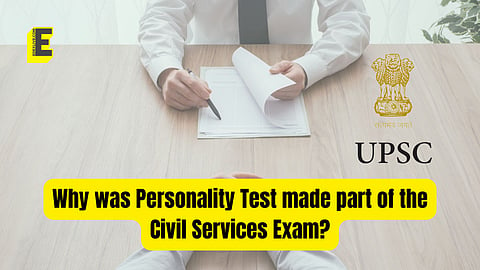

Any selection/recruitment method purely based on a written test is inadequate as a written test primarily gives some evidence of the intellectual calibre of the candidate, but it does not necessarily test his/her character, empathy, emotional intelligence, motivation, attitudes and the value system.
A written test does not give us any idea of the suitability of the aspirant for a career in the Civil Service. In the present scheme of examination it only helps to shortlist the numbers for selection.
The general suitability of candidates can be known only through the personality test ie interviewing the aspirant.
History
The use of the interview method as a part of the Civil Service Examination (CSE) testing methodology has been one of the original features of the recruitment system for higher civil services. Initially, it was called 'viva voce'.
Later it was rechristened as a 'personality test' without changing the earlier structure, style and method. In reality, it remained a 'viva ·voce' or, more simply, an interview.
Some of the objectives and justification of this personality test/interview are:
To assess the personal suitability of candidates particularly their social traits, mental alertness. Critical powers of assimilation, clear and logical exposition, balance of judgment, variety and depth of interests, ability for social cohesion and leadership intellectual and moral integrity.
Qualities such as capacity to make decisions, take and give orders under different situations, and ability to respond to challenging situations can be tested only in a personality test.
Assessment by personal contact would substantially improve the chances of judging not only intellectual qualities for which such contacts may provide a mechanism of confirmation but also the strengths and weaknesses of character courage and integrity.
During 1947-50, the interview test for all services uniformly carried 300 marks, but from 1951 to 1963, it was increased to 400 marks for the Indian Administrative Service/Indian Foreign Service (IAS/IFS) and for others, it remained unchanged.
From 1964 to 1978, the interview test for the IAS was reduced to 300 marks and for the IPS and other Central Services it was further reduced to 200 marks.
For the first time in 1979, with the recommendations of the Kothari Committee, the marks for all services were kept at 250, which was 12.2% of the total marks. Subsequently, however the weightage of the Personality Test was uniformly enhanced to 13.2% for all services on the recommendations of the Satish Chandra Committee in 1993.
This 13.2% as subsequently accepted as a kind of benchmark by various courts of law for the State Public Service Commissions as well.
(Gopalakrishna V, Director, Brain Tree in Hyderabad. The contributor has been training aspirants for the Civil Services examination for the last three decades. He can be contacted at braintreeindia@gmail.com)
